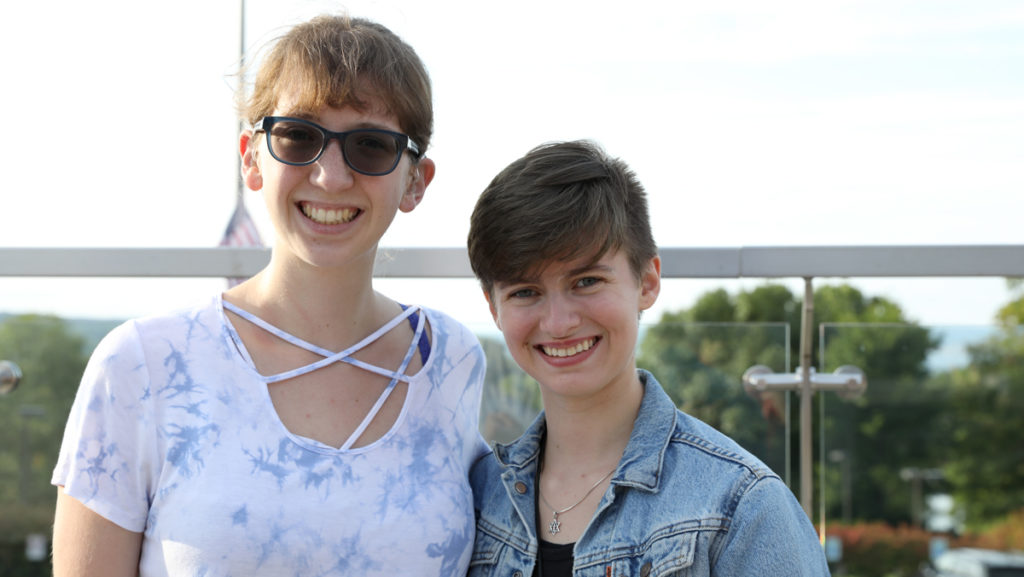A new club, Disability Education, Alliance and Resources at Ithaca College (DEAR@IC), has been established at the college and will focus on educating people about disabilities.
DEAR@IC met for the first time Sept. 26 and will meet at 8:30 p.m. every Wednesday in Friends Hall. The idea to create the club came to junior Kimberly Caceci, founder and president of the club, over the summer. The club will help provide a place for members to learn about what accommodations are available for those with disabilities, provide resources on disabilities to those who need them and help able-bodied people become allies. Caceci said one of the other goals of DEAR@IC is to collaborate with already existing services on campus like Student Accessibility Services and the Center for Counseling and Psychological Services.
Caceci said she was inspired to create the club partly because she wants to make the college more inclusive to those who have disabilities and partly because of her own struggles with campus accessibility.
When Caceci was 11, she was diagnosed with a hearing disability. She said she was not educated about what accommodations were available to her as a student when she was younger. She said she has had professors at the college try to avoid providing the accommodations she needed to learn successfully.
“I didn’t really know if I had anyone on campus who would relate to it,” Caceci said. “I think it’s important for myself but also for other people that might feel the same way to allow them to get that reassurance that they have a voice.”
Junior Ari Domeraski, vice president of the club, said he saw a note Caceci posted on social media asking if anyone else had experienced the same frustrations and experiences. He responded immediately, and the two of them decided to start a club. He said they both wanted the club to educate people on campus and to be a space where a community could form.
“The main thing about a club is getting people to come together and having a community,” Domeraski said. “The biggest thing I’ve noticed is that you can have friends, but having friends with disabilities and then friends without disabilities … there’s differences. There’s the whole thing of like, ‘I can’t go out tonight because I’m having a flare–up,’ and a lot of people just don’t get that. We want to be able to educate that college life is different for everyone, especially those with disabilities.”
Caceci said she agreed that educating people with and without disabilities is a priority of the club.
“If we can form a community of our own to help each other, I think that would be really rewarding,” Caceci said. “And I also don’t just want people with disabilities and their allies, but I also want to inform the community and other people who never really thought about this topic because sometimes it is overlooked.”
Domeraski said another reason he wanted to start the club was to address some of the issues within Student Accessibility Services. He said one issue in particular — providing proof of a disability — was frustrating to him.
“Who are they to tell us what’s enough when we’re the ones who are dealing with this?” Domeraski said. “A lot of the time, people are told to do something, and we have to say, ‘I’m sorry, because of my disability, I am not able to,’ and that’s not a good enough answer … and that’s extremely disappointing.”
KellyAnn Robinson, Student Accessibility Services manager, said Student Accessibility Services recognizes that each individual case is different but that documentation is essential to help those who need accommodations. She said she thinks a club like DEAR@IC can be beneficial to the community and help create a larger conversation about the topic.
“Like-minded individuals can connect, share experiences and, if needed, have a support system for addressing issues in our college, town, country,” she said. “Ithaca, as a college, has shown consistent dedication in areas of diversity and inclusion and strives to address current and past injustices.”
Patrick Bohn, one of the club’s advisers and assistant editor in the Office of College Relations and Communications, said challenges with campus accessibility exist on almost all college campuses and that part of the issue with Ithaca College’s accessibility is the natural landscape and weather. The hill the college is built on and the unavoidable snow can become issues for some students.
Bohn said the DEAR@IC club is important to the community because people with disabilities are a minority and should have a place on campus where they can feel supported and can support each other. He said it will also help educate those who do not have disabilities and have not thought about these issues.
“I really hope that the community comes away with a deeper understanding that there are a high number of individuals with disabilities on this campus … and an understanding of some of these challenges that individuals with disabilities face going to any college,” Bohn said.
Domeraski said he has already met with CAPS to discuss some teachable coping mechanism workshops the club could provide for those going through the transition into college with a disability. He said the club still needs to meet with Student Accessibility Services.
Robinson said collaboration is possible and encouraged to address and talk about current issues with accessibility on campus.
“We recognize that the world is not perfectly accessible, and we strive to slate that arc in a positive direction,” she said. “I would say a collaboration is not only possible but welcomed as it can only keep us connected, better informed and more aware of issues we all care about. I think this club can serve as a system to connect students, allowing ideas to flow not just from student to SAS and SAS to student but student to student.”








